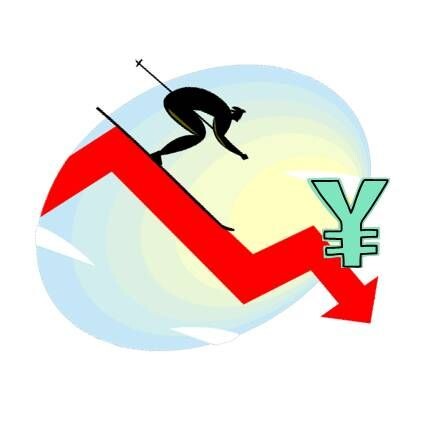hankyoreh
Links to other country sites 다른 나라 사이트 링크
Japan’s Abenomics squeezing S. Korean economy

By Park Soon-bin, senior staff writer
“Abenomics,” the aggressive quantitative easing monetary policy of the Shinzo Abe administration in Japan, is heightening risks to the South Korean economy.
In particular, the periodic inflows and outflows of short-term foreign-denominated funds are fanning financial market uncertainty, while the rapidly weakening yen is complicating South Korea’s recovery as exports continue to slump.
The Korea Center for International Finance (KCIF) released a May 26 compilation of reports from major overseas investment banks. The findings showed the side effects from the Abenomics approach of massive quantitative easing to be fanning uncertainty in financial markets across Asia, including in South Korea.
Based on Japan’s trade structure, the investment-banking firm Goldman Sachs predicted that the impact of the Abe administration’s approach on Asian trade would be limited. But it also said the result would likely be upward pressure on currency values, due to the heavy influence on capital flows, including increased movements of yen-denominated funds.
“Unless there’s a recovery in the global economy, Japan’s exports to other Asian countries are unlikely to improve just because of the weak yen,” the Goldman Sachs report said.
“But because Asian financial institutions are so dependent on Japanese loans and so volatile, there is certain to be growing appreciation pressure on their currencies as the yen released through Abenomics flows rapidly into surrounding countries,” it added.
Britain’s HSBC also mentioned the appreciation pressure on South Korea and other major Asian economies, predicting that governments and monetary authorities would respond with policies to control excessive foreign-denominated capital flows.
South Korean research institutions expressed concern about the continued decline in the yen’s value and rise in the won’s, with potentially dire implications for the real economy. In a May 26 report titled “The Plummeting Yen and Its Effect on the South Korean Economy,” the Hyundai Research Institute said the weak yen could undermine government policies to buoy the economy by hurting the trade and tourism balances, lowering the gross domestic product growth rate by 0.2 percentage points. The report predicted that South Korean exports would drop by 2.6% if the average annual exchange rate hits 100 yen to the dollar - down 20% from last year - with the balances of trade and tourism falling by US$1.5 billion and US$1 billion, respectively.
The rate passed 100 yen to the dollar on May 10. As of May 24, it stood at 102.1.
The LG Economic Research Institute (LGERI) concluded that the yen’s weakening since the fourth quarter of 2012 is already affecting the performance of South Korea’s export-oriented companies. A comparison of sales for major South Korean and Japan businesses with more than 50% of sales overseas showed continued negative growth for the former, with rates of -1.6% in 4Q12 and -1.1% in 1Q13. Meanwhile, Japanese companies saw a 5.1% spike in sales during the first quarter of this year.
“It’s only been six months since this weak yen really began,” said Lee Han-deuk, an analyst with LGERI. “So it’s a bit early to draw any conclusions about the effects the exchange rate changes are having on company performance. But it looks as though an impact is already showing in areas like cars and electronics.”
Please direct questions or comments to [english@hani.co.kr]

Editorial・opinion
![[Editorial] Does Yoon think the Korean public is wrong? [Editorial] Does Yoon think the Korean public is wrong?](https://flexible.img.hani.co.kr/flexible/normal/500/300/imgdb/original/2024/0417/8517133419684774.jpg) [Editorial] Does Yoon think the Korean public is wrong?
[Editorial] Does Yoon think the Korean public is wrong?![[Editorial] As it bolsters its alliance with US, Japan must be accountable for past [Editorial] As it bolsters its alliance with US, Japan must be accountable for past](https://flexible.img.hani.co.kr/flexible/normal/500/300/imgdb/original/2024/0417/6817133413968321.jpg) [Editorial] As it bolsters its alliance with US, Japan must be accountable for past
[Editorial] As it bolsters its alliance with US, Japan must be accountable for past- [Guest essay] Amending the Constitution is Yoon’s key to leaving office in public’s good graces
- [Editorial] 10 years on, lessons of Sewol tragedy must never be forgotten
- [Column] A death blow to Korea’s prosecutor politics
- [Correspondent’s column] The US and the end of Japanese pacifism
- [Guest essay] How Korea turned its trainee doctors into monsters
- [Guest essay] As someone who helped forge Seoul-Moscow ties, their status today troubles me
- [Editorial] Koreans sent a loud and clear message to Yoon
- [Column] In Korea’s midterm elections, it’s time for accountability
Most viewed articles
- 1[Column] The clock is ticking for Korea’s first lady
- 2Samsung barricades office as unionized workers strike for better conditions
- 3[Editorial] When the choice is kids or career, Korea will never overcome birth rate woes
- 4S. Korea, Japan reaffirm commitment to strengthening trilateral ties with US
- 5[News analysis] After elections, prosecutorial reform will likely make legislative agenda
- 6Japan officially says compensation of Korean forced laborers isn’t its responsibility
- 7Why Israel isn’t hitting Iran with immediate retaliation
- 8[Editorial] As it bolsters its alliance with US, Japan must be accountable for past
- 9[Editorial] Does Yoon think the Korean public is wrong?
- 10[Guest essay] How Korea turned its trainee doctors into monsters